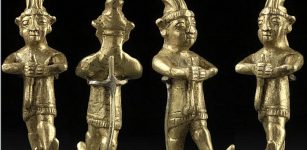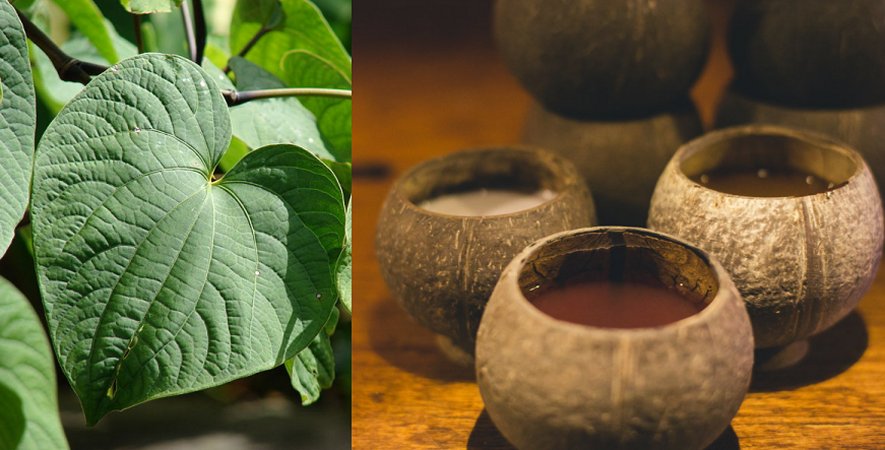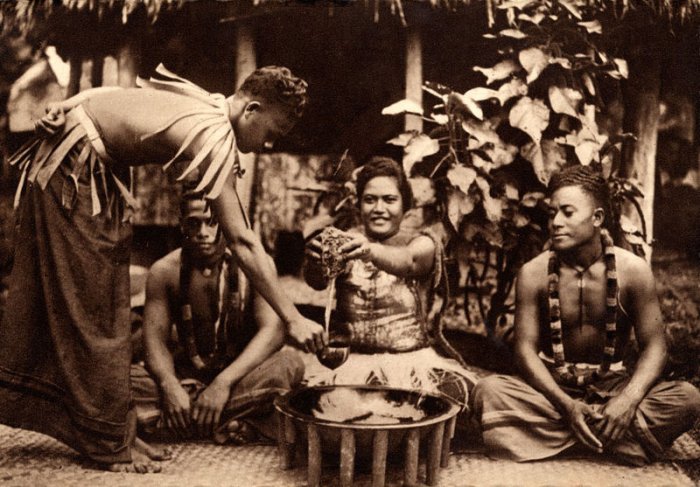Kava – Astonishing Ancient Plant That Improves Emotional Intelligence Is Gaining Popularity In The Western World
Conny Waters - AncientPages.com - Kava is an ancient plant that has been used by our ancestors for a very long time. Named after explorer Captain James Cook who encountered the herb on one of his journeys to the Pacific, Kava has been enjoyed long before written history.
Ancient people used the herb to reach a higher level of consciousness and improve their health. In the South Pacific it has been a ritual and celebratory beverage for thousands of years.
Left: Piper methysticum leaves. Credit: Public Domain - Right: Kava drink. Credit: Chronic Town USA
Modern scientists are now investigating whether the ancient plant is dangerous, but everything seems to indicate Kava is a good herb that eases anxiety, improves mood and concentration, calms the nerves, and on top of everything has an astonishing effect on emotional intelligence.
Peter Salovey and John D. Mayer coined the term ’emotional intelligence’ in 1990 describing it as “a form of social intelligence that involves the ability to monitor one’s own and others’ feelings and emotions, to discriminate among them, and to use this information to guide one’s thinking and action”.
Where Does Kava Come From?
Kava, as a drink is made from a root of a pepper plant called Piper methysticum. The plant is also known by the names Ava, Ava Pepper, Intoxicating Pepper, Kawa Awa, Kawa Kawa, Wati, Yogona, and Waka.
Samoan 'ava ceremony, c. 1900-1930. Credit: University of California Digital Libraries
The origin of the plant has been long debated. Oceanic cultures have an oral rather than written history and finding out where the plant first appeared hasn’t been easy. However, most botanists believe that Kava originated from Vanuatu and was then spread throughout the rest of the Pacific by seafaring islanders.
See also:
Ancient Secrets Of Mistletoe – Sacred Celtic Plant With Magical Powers
Airmid: Irish Goddess Of Healing And Herbs And One Of The Tuatha Dé Danann
The Ebers Papyrus – Most Famous Plant Medicine ‘Encyclopedia’ Of Ancient Egypt
Preserving Ancient Knowledge Of Kava
There is no doubt that Kava was familiar to Oceanic cultures long before Captain Cook discovered this area of the world in the late 1700’s. When Christian missionaries learned about the plant they tried to stop the use of it. Christians argued that Kava’s mind and heart-expanding properties were similar to alcohol. Still, unlike alcohol, Kava is non-addictive, non-inflammatory, and does not affect blood sugar levels. Despite the warnings from Christian missionaries, locals continued to enjoy their Kava and they still do it today. Kava plays a significant role in social gatherings in the South Pacific.
A painting showing women preparing kava. Credit: John LaFarge, Wikipedia
It is consumed at events such as weddings, funerals, naming, and healing ceremonies with the express purpose of bringing people together. Once a group of people drink Kava, it is accepted that they are one.
Kava should not be confused with Ayahuasca, a potent hallucinogenic brew used by Amazonian indigenous groups for centuries. Modern scientists have discovered that Ayahuasca can be used for healing purposes and treatment of eating disorders, but Kava has different benefits.
Whether the plant is good or bad for health is still a subject of debate, but recently there has been a renewed focus on the use of Kava and the herb is gaining popularity in the Western world.
What we should keep in mind is that there could many benefits of ancient herbal medicine that we are still unaware off.
Written by Conny Waters – AncientPages.com Staff Writer
Copyright © AncientPages.com All rights reserved. This material may not be published, broadcast, rewritten or redistributed in whole or part without the express written permission of AncientPages.com
More From Ancient Pages
-
 Secret Ancient Knowledge Of The Druids And The Mystery Of The Missing Library Of Iona
Artifacts | Sep 4, 2016
Secret Ancient Knowledge Of The Druids And The Mystery Of The Missing Library Of Iona
Artifacts | Sep 4, 2016 -
 Hidden 15th-Century Text On Medieval Manuscripts – Discovered By Students
News | Nov 23, 2020
Hidden 15th-Century Text On Medieval Manuscripts – Discovered By Students
News | Nov 23, 2020 -
 Wonderful Long-Lived Nymphs In Greek And Roman Mythologies
Featured Stories | Mar 29, 2024
Wonderful Long-Lived Nymphs In Greek And Roman Mythologies
Featured Stories | Mar 29, 2024 -
 Isle Of May Was A Pictish Healing Center – Monks Used Herbs To Treat Sick And Dying People
Archaeology | Feb 16, 2018
Isle Of May Was A Pictish Healing Center – Monks Used Herbs To Treat Sick And Dying People
Archaeology | Feb 16, 2018 -
 Giant Azaes-Itzamna: Ninth King Of Atlantis, Founder Of Chichen Itza And Teacher Of Maya People
Civilizations | Jun 29, 2017
Giant Azaes-Itzamna: Ninth King Of Atlantis, Founder Of Chichen Itza And Teacher Of Maya People
Civilizations | Jun 29, 2017 -
 History Of Jarlshof – Thousands Of Years Of History With Traces Of Picts, Vikings And Scots
Featured Stories | Jun 4, 2020
History Of Jarlshof – Thousands Of Years Of History With Traces Of Picts, Vikings And Scots
Featured Stories | Jun 4, 2020 -
 Golden Figurine From Yozgat Depicts Unknown Hittite God
Artifacts | May 11, 2016
Golden Figurine From Yozgat Depicts Unknown Hittite God
Artifacts | May 11, 2016 -
 On This Day In History: Charlemagne Became The King Of The Franks – On Dec 5, 771
News | Dec 5, 2016
On This Day In History: Charlemagne Became The King Of The Franks – On Dec 5, 771
News | Dec 5, 2016 -
 Sybil Ludington: Courageous American Girl Who Rode For Independence
Featured Stories | Dec 19, 2020
Sybil Ludington: Courageous American Girl Who Rode For Independence
Featured Stories | Dec 19, 2020 -
 Forgotten Notebook Reveals Da Vinci Understood Gravitiy Long Before Newton
Ancient Technology | Feb 22, 2023
Forgotten Notebook Reveals Da Vinci Understood Gravitiy Long Before Newton
Ancient Technology | Feb 22, 2023 -
 Unusual Grave Of The Trzciniec Culture Is An Archaeological Puzzle
Archaeology | Dec 23, 2019
Unusual Grave Of The Trzciniec Culture Is An Archaeological Puzzle
Archaeology | Dec 23, 2019 -
 A Scarab Seal At Tel Gerisa, Depicts Walking Lion – Symbol Of Strength, Power And Authority
Archaeology | Sep 5, 2023
A Scarab Seal At Tel Gerisa, Depicts Walking Lion – Symbol Of Strength, Power And Authority
Archaeology | Sep 5, 2023 -
 Ostia Antica – Unique Ancient Harbor City In The Suburbs Of Rome
Civilizations | Nov 29, 2018
Ostia Antica – Unique Ancient Harbor City In The Suburbs Of Rome
Civilizations | Nov 29, 2018 -
 On This Day In History: King Tut’s Tomb Is Unsealed And Opened – On Feb 16,1923
News | Feb 16, 2017
On This Day In History: King Tut’s Tomb Is Unsealed And Opened – On Feb 16,1923
News | Feb 16, 2017 -
 Neanderthals Of The Mediterranean Areas Became Extinct But Not Because Of Climate
Archaeology | Jul 20, 2020
Neanderthals Of The Mediterranean Areas Became Extinct But Not Because Of Climate
Archaeology | Jul 20, 2020 -
 Hina Matsuri Festival – Sending Dolls In Boats Into The Ocean To Celebrate Girl’s Day In Japan – Ancient Shinto Tradition
Ancient Traditions And Customs | Apr 29, 2019
Hina Matsuri Festival – Sending Dolls In Boats Into The Ocean To Celebrate Girl’s Day In Japan – Ancient Shinto Tradition
Ancient Traditions And Customs | Apr 29, 2019 -
 Once-In-A-Lifetime Find – Ancient Roman and Saxon Cemetery Unearthed In Leeds
Archaeology | Mar 30, 2023
Once-In-A-Lifetime Find – Ancient Roman and Saxon Cemetery Unearthed In Leeds
Archaeology | Mar 30, 2023 -
 A 3,500-Year-Old Grape Seed Sheds Light On Great Tradition Of Vineyards Of Anatolia’s Çal And Region
Archaeology | Sep 13, 2023
A 3,500-Year-Old Grape Seed Sheds Light On Great Tradition Of Vineyards Of Anatolia’s Çal And Region
Archaeology | Sep 13, 2023 -
 Cursed Dudleytown – What Really Happened In America’s Village Of The Damned In Connecticut
Featured Stories | May 27, 2020
Cursed Dudleytown – What Really Happened In America’s Village Of The Damned In Connecticut
Featured Stories | May 27, 2020 -
 Biblical City Of Tarsus: Excavations Reveal Its Secrets From Paul the Apostle’s Times
Archaeology | Jan 4, 2016
Biblical City Of Tarsus: Excavations Reveal Its Secrets From Paul the Apostle’s Times
Archaeology | Jan 4, 2016



